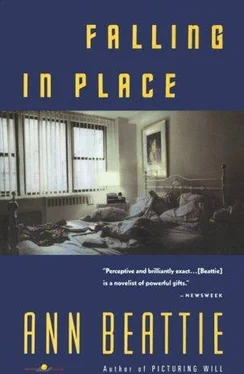Ann Beattie - Falling in Place
Здесь есть возможность читать онлайн «Ann Beattie - Falling in Place» весь текст электронной книги совершенно бесплатно (целиком полную версию без сокращений). В некоторых случаях можно слушать аудио, скачать через торрент в формате fb2 и присутствует краткое содержание. Год выпуска: 1991, Издательство: Vintage, Жанр: Современная проза, на английском языке. Описание произведения, (предисловие) а так же отзывы посетителей доступны на портале библиотеки ЛибКат.
- Название:Falling in Place
- Автор:
- Издательство:Vintage
- Жанр:
- Год:1991
- ISBN:нет данных
- Рейтинг книги:4 / 5. Голосов: 1
-
Избранное:Добавить в избранное
- Отзывы:
-
Ваша оценка:
- 80
- 1
- 2
- 3
- 4
- 5
Falling in Place: краткое содержание, описание и аннотация
Предлагаем к чтению аннотацию, описание, краткое содержание или предисловие (зависит от того, что написал сам автор книги «Falling in Place»). Если вы не нашли необходимую информацию о книге — напишите в комментариях, мы постараемся отыскать её.
Falling in Place — читать онлайн бесплатно полную книгу (весь текст) целиком
Ниже представлен текст книги, разбитый по страницам. Система сохранения места последней прочитанной страницы, позволяет с удобством читать онлайн бесплатно книгу «Falling in Place», без необходимости каждый раз заново искать на чём Вы остановились. Поставьте закладку, и сможете в любой момент перейти на страницу, на которой закончили чтение.
Интервал:
Закладка:
It was Friday, and Nick and Laurie, who were going to be on Martha’s Vineyard to visit friends, were going to stop at the house that night. He had asked Louise if that was all right, or if she would prefer to be alone. She had not said that she preferred to be alone, and after a few seconds she had said that it was all right. He had the feeling that she thought it was an odd request, but nothing harmful — like someone asking if he can brush his teeth in front of you. He hated it that even on vacation she had brought the little plastic key, and was rolling the toothpaste up, from the bottom. He had removed the key, flushed it down the toilet, and squeezed the tube hard, in the middle. She had not said anything about it. He had been embarrassed after he had done it. He had been embarrassed after he questioned the woman in the bikini. Embarrassed, the night before, when he had thrown off his clothes and a breeze had come up and she had seen him shiver before he jumped. Embarrassed that she had picked up the plates and washed them. Embarrassed that she had gone to bed. To cheer himself up, he kept thinking about what Nick told him — that not all of it was his fault. His mother said so, too. Only Louise did not say so. The female psychiatrist, whom he seemed always to talk to, had granted that it was true, but seemed to think that it was unimportant to notice in what ways he wasn’t responsible. He wanted to think that it was over, but actually very little of it was over. Nobody knew yet what damage had really been done to all of them. In the evening, he liked to walk on the beach and watch the sun go down. It was so simple to see that the day was over, that the blackness would spread out, intensify. When he was alone, he lost all sense of time: He might sit for an hour, two hours, three. He sat alone in the den downstairs, while upstairs Louise slept. He went over and over it in his mind, gaining no ground. All the facts were so simple: that it wasn’t a good marriage, that he loved Nina, that his son had shot his daughter. Louise would not watch the sunset with him because the sun was huge and deep-pink above the water, and when she looked at it, all she could think of was blood. The blood swirling in Nina’s sink: a little cut, a small tragedy. The blood on the ground: the cops had blasted it away with the garden hose. They had cleaned up as though someone had made a faux pas. They had taken pictures of the bloody ground, and then they had washed the area with a hose: the polite host, passing no comment, silently mopping up spilled wine.
Nina felt responsible. “You talk as though you were a magnet,” he said to her, “as though I had to be pulled along. You’re not being fair to either of us. You aren’t acknowledging that this is still the right place for me to be. That you want me here.” She had kept crying. “Look,” he had said, “isn’t this where I belong?”
“I was a magnet,” Nina had said. “I had advantages she didn’t have. I did pull you along.”
“What advantages?”
“Because I’m young, and she’s not. Because I have this small, quiet place for you to be, and at home it’s the way you always tell me it is when you have a barbecue or something awful like that. You like it here because you’re left alone.”
“I could be in a cave and be left alone.”
“It is a cave,” she had shouted. “It’s cramped , it’s not cozy. I hate it that you love it so much, that you have so much and you want so little.”
“What do I have?” he had said, and she had been completely exasperated. “Pillars at the end of my driveway,” he had smiled. “What else?”
“Acres of land. Children. A big house. Try to realize what you have.”
“You’re what I want.”
“Do you know what I did?” she had said. “I got a friend of mine to drive me to your house. Do you believe that I did that? Do you know why I did it? Because if there were pillars, I was never going to speak to you again. Because you pretend your house is nothing , that all of it is nothing, and I know it isn’t true. That house is beautiful . I looked up the driveway and saw a huge tree. I can’t understand what you want with this — with this tiny apartment, with me. Because I’m pretty? Why do you like me? I can’t remember.”
“It’s not as though I want to burrow into this apartment and never leave,” he said.
“You’re not answering the question.”
“God almighty. I show you how I love you, don’t I? I’ve told you why I love you. Because we have good times together, because there’s no such thing as time when I’m with you.”
“You always look at your watch and leave,” she had said.
Slow time. Slow motion. It had been a hard climb to get to her, in more senses than one. It had been hard to face his feelings for her, when he thought he had all his feelings arranged, under control. It was as if somebody had stood up in the middle of a familiar song and played a brilliant solo: Was it worth being amazed, when things got disturbed so that they would always seem odd if you put them back together the way they were? He had debated. He had not slept with her. And then he had slept with her and pretended it did not matter. It was so difficult, and he was so slow in coming around to what he had to do. She was right that he hid in her apartment. He was hiding from himself, or at best playing peek-a-boo, pretending it was a safe game and that there were only little surprises: the infant seeing that it’s still a friend behind the fingers. Rules of the game: The peek-a-boo is always gentle, never shouted. You disappear, but can still be seen. The house in Rye. The house in Connecticut. The apartment on Columbus Avenue. She had joked that he would come back reincarnated as confetti. His son had shot his daughter, and little blood vessels, little pieces of tissue, had torn apart, frayed.
Nina was away in the Berkshires, and he couldn’t call her for two more nights. She had taken a week off and gone away to think. For two of those days, at least, Peter Spangle, on his way to see an old friend in New Hampshire, would be with her. He could really see how you killed somebody over love, but he could not see how you shot someone out of hatred. Maybe that was what it appeared to be, too — that John Joel hated Mary. For the millionth time, the billionth time, he thought: My son shot my daughter.
It was late afternoon. He headed back toward the house. He could feel the heat rising from his collarbones and his shoulders, and he knew that he had gotten too much sun, that his shoulders were going to hurt. He touched the skin with his fingertips and he could feel the soreness, like pressing on a bruise. When John Joel and Mary were little children and they had splinters, bug bites, cuts, he used to examine them before he rubbed medicine on the area or carefully pinched up the skin to draw out a splinter. He hated it when they cringed from him. He was being so gentle. He could remember, one time, yelling at Mary, “You’re not being fair. I put my finger an inch away from the cut to steady your arm so I could see if you got glass in it. I couldn’t possibly be hurting you. You’re just afraid because I’ve got big hands.” Louise had thought that that was hilarious. She had started laughing, and that had started Mary crying, and he had been so angry that he had stalked off, his hands at his sides feeling like they were encased in catcher’s mitts. As Nick said, it was not all his fault.
He watched a child playing in the wet sand at the water’s edge, pressing what looked like a gigantic cookie cutter into the sand, standing back and looking approvingly at what she was creating: a chain of big ducks, beaks to tails, stretching and stretching until a wave washed over them, and the child began again, a little farther back.
Читать дальшеИнтервал:
Закладка:
Похожие книги на «Falling in Place»
Представляем Вашему вниманию похожие книги на «Falling in Place» списком для выбора. Мы отобрали схожую по названию и смыслу литературу в надежде предоставить читателям больше вариантов отыскать новые, интересные, ещё непрочитанные произведения.
Обсуждение, отзывы о книге «Falling in Place» и просто собственные мнения читателей. Оставьте ваши комментарии, напишите, что Вы думаете о произведении, его смысле или главных героях. Укажите что конкретно понравилось, а что нет, и почему Вы так считаете.












